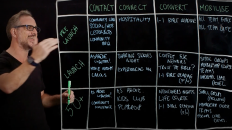Part 1: Fellowship Groups not Bible Studies
Part 2: Citywide Gathering not Lunchtime Bible Talks
Training is a massive part of campus ministry and it should be. As Tim Keller says in Center Church:
Specialized evangelistic ministries, reaching particular groups… of particular importance are effective campus and youth ministries. Many of the city church's future members and leaders are best found in the city's colleges schools…. Winning the youth of a city wins city natives who understand the culture well.' (p. 375)
And AFES's has enshrined this in our mission:
Mission
To promote the mission of Christ in Australian universities by building evangelical student groups that:
- evangelise students by proclaiming Jesus Christ as Lord
- encourage growth toward maturity in Christ
- train students in the skills and character to serve Jesus and his people [my emphasis]
- send graduates throughout Australia and the world to serve Christ [my emphasis]
And values:
Leadership
AFES is committed to identifying and training people who will provide leadership for the Christian community and for the world.
We own this priority, but have put it into practice carefully.
Training Courses are satisfying, but they don't necessarily train
It sometimes seems like we drift into training Christians so that they can mature enough to become leaders of training courses to train still more Christians. A perpetual teacher's college!
The purpose of training is not to be trained. Nor to be able to train. The purpose of training is to enable people to do something – live the godly life, share the gospel, edify believers. So we need to measure the content, the teaching method and the amount of time spent in training according to its effectiveness to reach the training goal(s).
Sadly, sometimes campus ministry – because the staff are not bogged down with parish duties (and there tends to be a higher ratio of staff:students than pastor:congregation), and because the students often have more discretionary time, and we are in a educational setting – gets bogged down in endless training courses. Hours and hours of time and forests of paper spent.
It feels like we're doing a lot. And it feels like we're doing the Right Stuff. But I want to suggest that more training courses doesn't mean better training. In fact, training courses don't necessarily train that well at all!
Integrated training
So we aim for a training philosophy of integrated training. We don't need to run a 'Training Night' to demonstrate we are training. Rather, we look at our whole ministry program and aim to integrate it:
1) By using existing ministry structures to provide training opportunities: we celebrate the training context that all our 'non-Training Night' events offer. You can train as a part of a 1:1 ministry year, you can provide training in small groups, you can train through providing resources (eg links on Facebook), you can train through regular conferences and you can train on the job (see 'Practical Training' below).
2) To make sure the training serves the ongoing ministry: So we train students to fulfill their ministry role. We train them in preparation for particular mission events. We do want to equip students in things that may be helpful in the long term. But our focus is things that are immediately relevant to their current ministry, and so also able to be put into practice.
Practical training
A lot of our training doesn't involve a training course at all. Most of the ministry formation in skills, values and theology come about in the rough and tumble of doing ministry. It is in giving feedback on how a student led a small group, working through the pros and cons of a new idea, giving some extra input to help them with a difficulty or opportunity. It is sad to think that we will under-value and maybe under-do this kind of training if we get too fixated on running training courses.
So also, when it comes to running courses, I've found that people learn best if they need to use their training and have an opportunity to do so soon afterwards. So practically-oriented training makes a lot of sense. And if they don't have an already-available avenue for putting their training into practice, taking the time to FIND an opportunity is well worth it.
Training Outcomes and Training Priorities
We only have students for a short time and they won't remember everything we teach them, so we don't try to teach them lots possible skills, but those things they will most likely use now and in the near future.
I think it is better to train a few skills and convictions regularly and thoroughly, and risk seeming reptitive than many topics but not have much retention.
Two tools that help us do this, are our 'Training Outcomes' and our 'Training Priorities'. We pull this out whenever we are planning the program for a MYC or a training event – to make sure we are on track.
1) Training Outcomes is the list of things we aim to train every student in during their time with us, in the areas of knowledge, life and ministry. Things like 'How to explain Two Ways To Live' and 'Regular Quiet Time'.
2) Training Priorities are the kinds of training we focus on. We work on two axes: relevance to Training Outcomes and relevant to current ministry needs/priorities. So for example:
- 'How To Lead a Sunday School' is not one of our Training Outcomes nor relevant to our current ministry needs – so we will probably never run this course.
- 'How to explain the gospel to a class-mate' is both one of our Training Outcomes and relevant to our ministry here and now, so chances are we are running something like this fairly often.
Training leaders more than just general discipleship
I have blogged on this in more detail elsewhere. Our aim is not to train every Christian at UTAS equally. We have a priority towards raising up leaders.
We are especially interested in focussing our energy on those who:
- Have potential to make a big difference for the campus mission while at uni and/or
- Have potential to be Christian leaders in the future.



